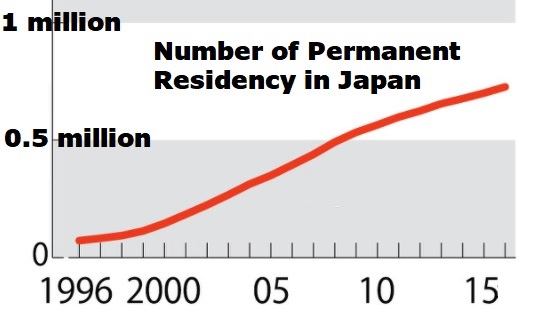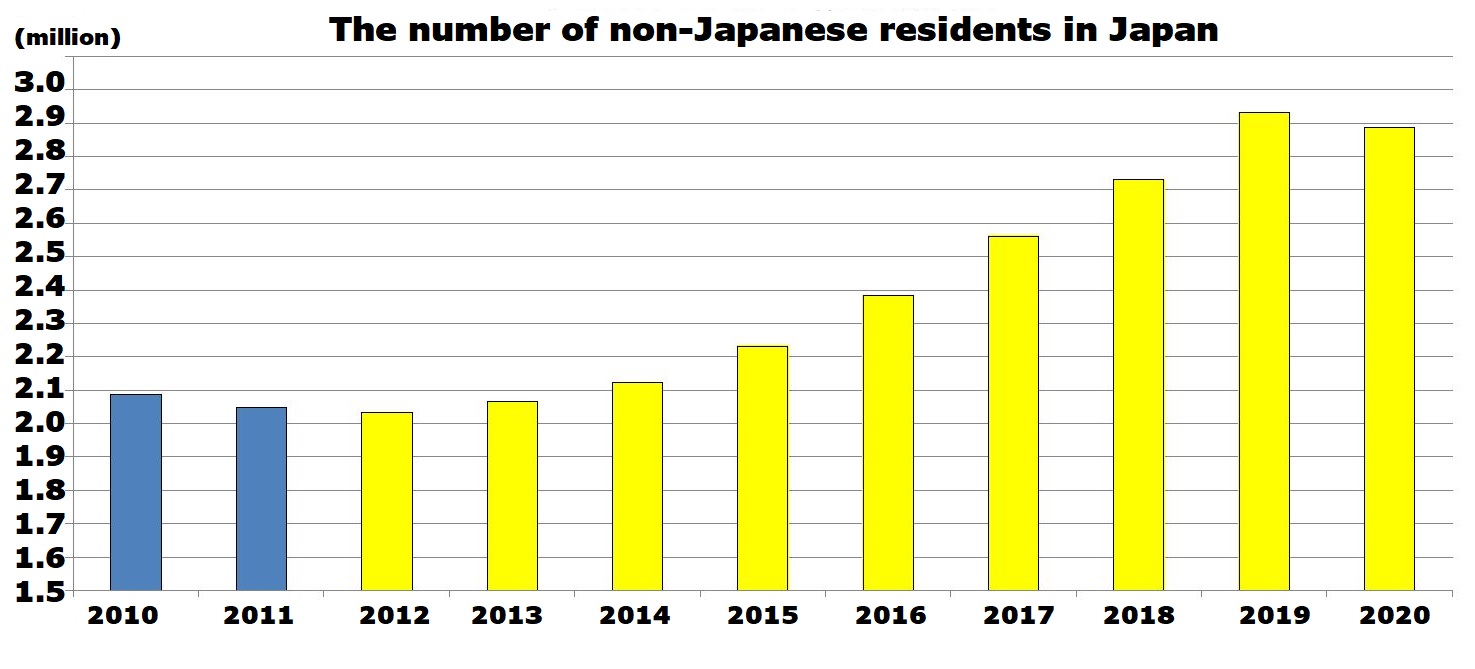“Problematic Permanent Residency in Japan”
Foster togetherness or Xenophobia? : Problematic Permanent Residency in Japan

As to whether to grant permanent resident foreigners the right to vote in local elections has become a major issue, foreigners with permanent resident status are now drawing attention. If the right to vote is granted, it will be given to a total of 910,000 permanent resident foreigners comprising 490,000 (general) permanent residents and 420,000 special permanent residents mainly consisting of Koreans and North Koreans residing in Japan. Among them, the number of permanent residents (the former) has been increasing at a fast rate. Some intellectuals are concerned that this issue is not being much discussed in the light of Japan’s national interests. On the other hand, there are voices appealing for the promotion of foreigners’ human rights, facing the reality that an increasing number of foreigners have been becoming long-term or permanent residents.
Declaring Numerous Dependents on Final Income Tax Returns
“Chinese permanent residents’ final tax returns are awful,” an official of a tax office in the Kanto region reveals.
“They declare many dependents that have to be counted on the fingers of both hands, including their parents, brothers and sisters, their spouses’ parents, brothers and sisters all living in China.”
This is their tax reduction strategy that takes advantage of the system in which a payer of income or resident tax can take a certain amount of tax deduction for each dependent and get a corresponding tax refund.
“They try to increase the number of dependents until the amount of their tax payment finally comes to zero. If the number of dependents is not enough, they start all over again to declare more dependents. This tendency is evident especially among Chinese residents in comparison to other foreign residents such as Koreans and Russians. This is not against the law and things like this may happen in the country of big families, but ---.”

According to statistics gathered by the Immigration Bureau under the Ministry of Justice, the number of foreign residents in Japan was about 2.21 million at the end of 2008, making up 1.74% of the total population. Among these foreign residents, the number of foreigners with permanent resident status in which the period of stay and work are not restricted was about 492,000, close to 500,000.
The number of special permanent residents mainly consisting of Koreans and North Koreans, which had once been the largest, decreased year after year due to their aging. In the meantime, the number of permanent residents increased tenfold in the previous 10 years, having exceeded the number of special permanent residents in 2007. In particular, the number of Chinese residents was 142,000. That is, one in three permanent residents was Chinese.
“We Can Hold a Class Reunion in Japan”
JNOC is a Chinese newspaper company based in “Chinatown” in Ikebukuro in Tokyo, where Chinese residents have formed a community. According to its editor in chief, Jiang Feng (50), the number of Chinese residents in Japan increased in and after the 1980s because of the Chinese government’s program of economic reforms that was started in 1978 with the aim of transforming the Chinese economy into a market economy.
Looking back on those days, Jiang said, “The Chinese people at that time had three reasons to come to Japan. They were the government’s economic reform program, the people’s willingness to learn a foreign language and interest in Japan that was demonstrating its economic power in the middle of a bubble boom. Those people were so motivated that they were willing to wash dishes from the day subsequent to their arrival in Japan.” In addition, he said the following about the tendency of the Chinese people who are coming to Japan these days.
“Now, many of the Chinese people coming to Japan are the children born under the one-child policy started at the same time as the economic reform program. In many cases, they do not come to Japan from their own motives but are sent by their parents who want them to broaden their views. It seems that the number of Chinese people coming to Japan for economic reasons has decreased.”
A Chinese woman (24) from Fujian working part-time at a Chinese restaurant in Ikebukuro came to Japan as a foreign student when she was 19 after graduating from high school.
She said, “I was young and wanted to challenge myself to live in a foreign country.” As for the reason why she chose Japan, she explained, “I wanted to come to Japan because it was an advanced country. I had admired Japan from my childhood because people were saying that Japan had high technological skills, Japanese people were kind and it was a clean country. In fact, Japan is convenient and it is easy to live here. There are a lot of trains running throughout the country including Shinkansen bullet trains. For shopping, convenience stores are open 24 hours.”
Among her 40 classmates in high school, about 20, that is a half of them, are now living in Japan in Tokyo, Osaka or Kobe for example.
“It’s as if we could hold a high school class reunion in Japan. Among my friends in high school, only a few of them are still living in China. Most of them are now living in the United States, Australia, Canada, or Japan. The United States and Japan are especially popular.”
Long-term or Permanent Residents Aiming to Become Immigrants
It is not just about the number of permanent residents. Looking at the transition over the past 10 years of the number of registered foreigners, that is, foreigners who registered as an alien when they arrived in Japan, an increase in the number of Chinese people is exceptionally sharp. Among all registered foreigners at the end of 2000, the largest group was that of Koreans and North Koreans, reaching 638,000 in total. The Chinese group was the second largest, but the number of them was 272,000, far below the number of Koreans and North Koreans.
However, the number of registered Chinese residents increased at a high rate of 50,000 per year. In 2007, the number reached 606,000, outstripping the number of Koreans and North Koreans (593,000) for the first time. The number increased up to 655,000 in 2008.
“In reality, the number of Chinese residents is much more than 650,000. When the number of Chinese people who have acquired Japanese nationality is added, I think there are about a million Chinese residents in Japan,” says a Chinese man who is a 20-year resident in Japan and working for a Chinese newspaper company in Ikebukuro.

(For the latest figures, visit Office of Immigration and Residence Management)
According to this newspaper company, there are about 20 Chinese newspapers in Japan and each newspaper sells or distributes 10,000 to 20,000 copies every other week.
Even the Chinese people who have relocated to Hokkaido or Kyushu subscribe to these newspapers, which are an important source of information for them. All advertisements in these newspapers are aimed at the Chinese. The Chinese newspaperman says, “We have no lack of advertisements although the advertising costs have been reduced due to the recent recession.”
The number of Chinese people is high not only among registered foreigners. Among all foreigners who visited Japan in 2008, the number of Chinese was 134,000, excluding those who stayed for a short term for sightseeing or business, which was far more than that of other foreigners. It suggests that, unlike other foreigners, the Chinese people who come to Japan intend to stay for a long term or become immigrants.
Two Thirds Are People with “Anti-Japanese” Education
Regarding the situations described above, Hideyuki Sekioka (48), a nonfiction writer, points out, “In the case of the Chinese residents, there are 140,000 people who have already acquired permanent resident status, plus a large group of people which you can call “would-be permanent residents.” If left uncontrolled, the number of Chinese permanent residents will increase explosively.”
According to the statistics gathered by the Immigration Bureau, at the end of 2008 there were 57,336 Chinese residents who have the status of “Spouse or child of Japanese national” and 6,170 Chinese residents who have the status of “Spouse or child of permanent resident.”
“The residents with these statuses are allowed to stay in Japan up to three years, but the permission for their period of stay can be renewed. For these residents, the requirements for acquiring permanent resident status are also relaxed. These statuses are almost similar to permanent resident status,” said Sekioka.
In addition, there are 33,600 Chinese residents who have the status of “Long-term resident.” The long-term residents are defined as “those who are authorized to reside in Japan with a designation of period of stay by the Minister of Justice in consideration of special circumstances.” Their period of stay is also limited up to three years but there are no restrictions on their occupations or working hours. Sekioka says, “The only difference between the long-term residents and permanent residents is whether their period of stay is limited or not. However, because the long-term residents can renew their period of stay personally, I would say there are many loopholes in the law.”
As of the end of 2008, there were 142,469 Chinese permanent residents and 2,892 Chinese special permanent residents. However, the total number reaches 242,467 when the number of Chinese “would-be permanent residents,” such as the long-term residents and the spouses or children of Japanese nationals or permanent residents, is added.
On the other hand, looking at the 1.21 million Chinese people who newly came to Japan during 2008 by age bracket, 100,000 people were in their teens or younger, 350,000 people were in their 20s, 320,000 people were in their 30s, 230,000 people were in their 40s, 120,000 people were in their 50s, and 60,000 people were in their 60s or older.
Thus, people in their 30s or younger accounted for two thirds of the total. They are the generations that received the patriotic, anti-Japanese education under the former Chinese president Jiang Zemin.
Advancing Togetherness Rather than Anti-foreignism

“Needless to say, the majority of the Chinese people seeking permanent resident status must be good citizens,” says Sekioka. “But remember the torch relay for the Beijing Olympics. Many Chinese residents from around the country gathered in Nagano and exhibited outlandish behavior and held threatening, politically-charged demonstrations.” He raises an alarm as follows:
“We can’t exclude the possibility that, in times of a national emergency, the Chinese residents in Japan may take unified group action under orders from authorities in Beijing or the Chinese Embassy with the aim of promoting the national interests of China and damage those of Japan. It is a preposterous idea to give these worrisome 100,000 or more foreigners the right to vote in elections, even at the local level.”
On the other hand, it is true that the number of foreign permanent residents has actually been increasing. A civilian organization seeking for the promotion of foreigners’ human rights says, “So many foreigners are now living in various areas of Japan and compensating for the lack of labor in so-called 3D (dirty, dangerous and demeaning) worksites shunned by the Japanese people. The number of foreigners may further increase but will not decrease in the future. Instead of taking anti-alien attitudes, we’ll have to seriously think about how to create an environment where the Japanese and foreigners can live together in harmony.”


